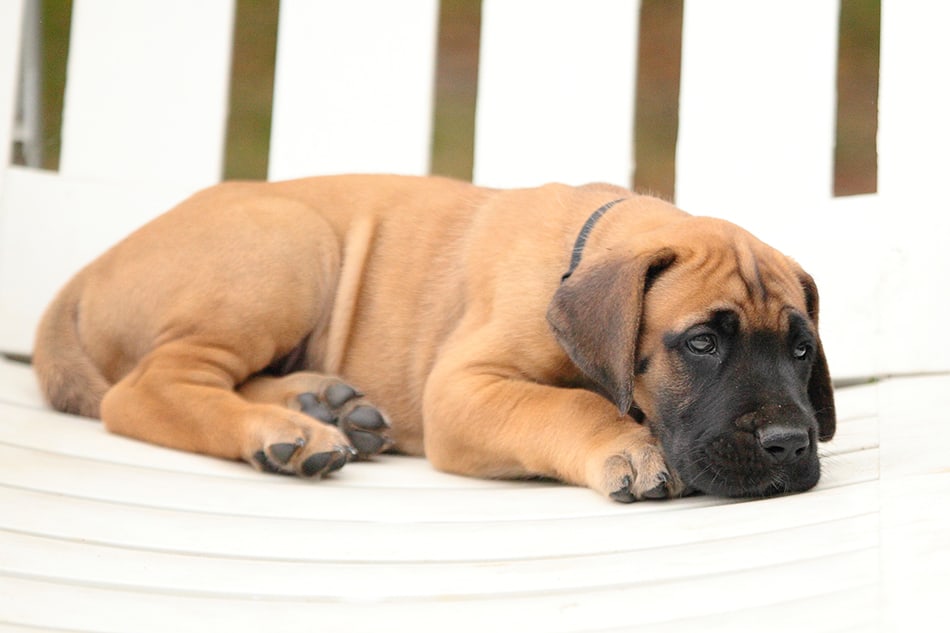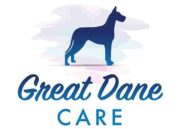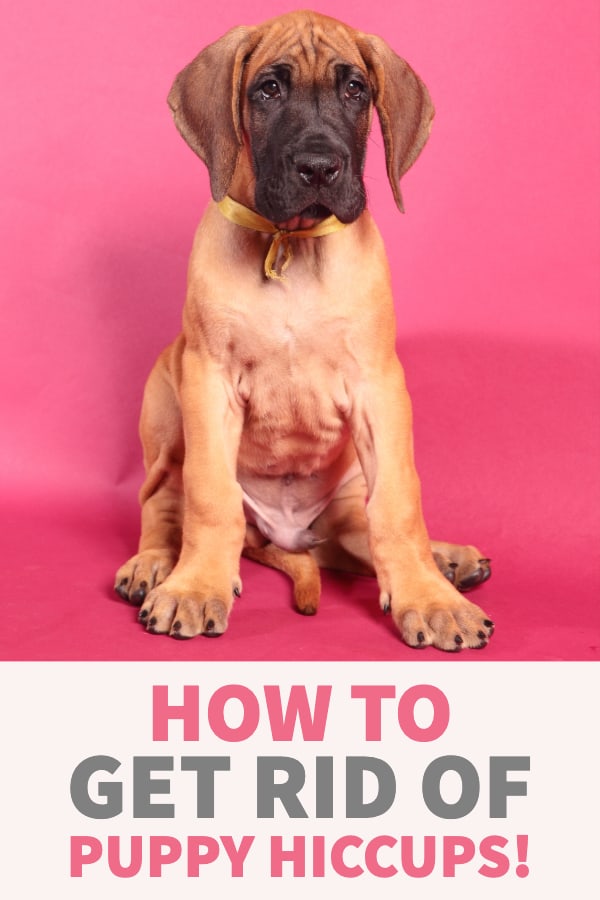
It’s just a regular Saturday night and you’re cuddled with your dog. All of sudden, it happens again. The hiccups are back! Your Great Dane puppy always seems to have them – but why? Is it something that you should be worried about?
There’s no need to worry when your Great Dane puppy has a bout of hiccups. They are caused by involuntary contractions of the diaphragm and occur more frequently in puppies. Within a few minutes, the hiccups should subside and your dog will be back to normal.
Why You Really Shouldn’t Be Worried About the Hiccups
Sure, hiccups are annoying. We’ve all experienced them and know how inconvenient they can be. That’s exactly how your dog feels. He’s probably wondering what those awkward jerky movements are too!
Hiccups are caused by involuntary contractions of the diaphragm. They generally occur more frequently in puppies and will slow as the dog gets older. Causes of hiccups can vary and can be due to stress, anxiety, and even excitement.
While they are cumbersome, there is no need to worry. Your dog isn’t in any danger and may barely even recognize what’s happening.
However, it’s never a bad idea to give your dog some extra love during hiccups. A couple of extra cuddles will surely make each of you feel better 🙂
Why Do Dogs Even Get Hiccups?
Hiccups can be caused by several different reasons but the most common is that a dog eats or drinks too quickly. This causes him to intake more air that can result in hiccups.
Other reasons can include extreme play or excessive barking. Both of these actions can include rapid breathing and cause large amounts of air to be inhaled. This can lead to a case of the hiccups.
As noted above, hiccups can be more common in puppies as they are generally more playful and full of energy. This excessive energy can cause rapid breathing and air intake which can pave the way for hiccups to occur.
There have also been some theories set forth from vets that hiccups are just leftover reflexes from your pet’s days in the womb. The theory goes on to reveal that puppies exercised their lungs while in the womb so when they emerge that “exercise” can cause hiccups.
It’s another interesting theory as to why your pet may develop hiccups.
Either way, you will note that as your puppy grows up and his body matures, the frequency of hiccups should begin to decrease.
When There May Be Cause for Concern
As stated before, most hiccups are just the result of an involuntary contraction and aren’t harmful.
Although they can be surprising if you’ve never noticed them in pets before, they usually go away on their own. However, there can be times when hiccups may be a cause for some concern.
When your pet has hiccups they usually last for just a few minutes and then your dog is right back to normal. However, if there’s ever a time when the hiccups last for more than an hour or seem to be chronic, it may be a good idea to check with your vet.
There are cases where prolonged and chronic hiccups are a result of an underlying disease. The most common sources being:
· Respiratory issues – If the hiccups are accompanied by coughing and sneezing, it may be a sign that your dog has other issues. Be on the lookout for wheezing as well. These symptoms can be a sign of pneumonia, asthma or other respiratory problems.
· Stomach problems – If your dog experiences diarrhea or vomiting with hiccups it could mean a gastrointestinal issue is present. Many such issues in dogs can be treated but you need to be aware of it first. Keep a careful watch on your dog’s diet and their bowel movements.
· Parasites – Lethargy, vomiting, and hiccups? Well, it could be a sign that your dog may have a parasite. Dogs can be treated for parasites so be sure to let your vet know if you notice any of these symptoms. A simple round of medication can knock the parasite out of his system.
As with any issue with your pet, if you feel that something is wrong, an appointment should be made with your veterinarian. They’ll be able to answer any questions and do a thorough examination of your dog.
It’s better to have peace of mind so get your pet checked out if you have any concerns!
Do Hiccups Have Any Relation to Bloat?
Bloat in dogs is life-threatening. It’s a dire situation and all pet owners should be aware of the symptoms. With that said, hiccups are an entirely different ballgame and is not a symptom of bloat.
Bloat is the swelling of the abdomen and can result in the painful twisting of the stomach. This twisting can trap gases and cause a myriad of problems. If not detected early enough it’s life-threatening for dogs.
There are certain breeds that are more susceptible to bloat so it’s always important to do your research before you decide on a dog. However, there are several things dog owners can do that are believed to help prevent bloat in their pets.
- Feed them small meals throughout the day
- Use a raised dog food dish if recommended by the vet
- Let your pup rest up to an hour after feeding
Knowing the signs of bloat is important and can save your dog’s life. However, hiccups are not caused by bloating so there should be no concern on that end.
How to Get Rid of Puppy Hiccups
While the majority of hiccups last only a few minutes, it may be a few minutes too many for some pet owners. If you can’t stand to see your dog in any sort of distress, here are a few things you can try to help banish the hiccups!
· Belly rubs – What dog doesn’t love a good belly rub? A simple pat on the belly may help alleviate the hiccups. It may also cause your dog to relax, which can regulate breathing and loosen up the diaphragm.
· Drink some water – This trick has been known to work for humans so it may help doggies too. The only issue is that the water should be taken slowly, sometimes that’s hard to do when you have an energetic little puppy, but it can’t hurt to try!
· Trying something sweet – Giving your dog a bit of honey or maple syrup may be just the distraction needed to help get rid of those nasty hiccups! Just be sure not to give him anything to chew as it could be a choking hazard.
Hopefully, some of these tips and tricks help to ease the burden of hiccups in your pooch. They’ll only last for a few minutes so hang in there, it’ll be over soon!
Ways to Help Prevent Hiccups
The following tips may not prevent all bouts with hiccups but you may see some improvement after you implement them.
Let’s take a look at some of these options now!
Prevention Tip #1 – Exercise
As noted above, it’s common for puppies to have hiccups due to their exciting nature and rambunctious play. The hiccups can occur as they take on more air.
One of the best things to continue to do for your pup would be to give them plenty of exercise. This allows them to release their built-up energy over the course of multiple sessions instead of a single, frantic, hiccup-educing one 😉
Not only will exercise help with your pup’s breathing and ability to get rid of all that excess energy, but it’s also a great way to bond and keep your pet healthy.
Prevention Tip #2 – Stop Speed Eating
One of the biggest reasons for hiccups is eating too quickly. Young dogs are especially prone to this. They’re so excited and so hungry that along with gulping down their food, they gulp down excess air that can lead to hiccups.
Because of this, it may be a good idea to feed your dog more often, in smaller amounts. He may not be as hungry throughout the day with have several meals instead of 2 or 3 larger ones. If you’re not sure how often or how much to feed your Great Dane puppy, make sure to take a look at our dedicated article on the topic here.
Along with that, try feeding your pup with a bowl that has dividers or puzzles. These items make your dog work a little harder for their food but also slows them down. Inhaling their food is the reason the excess air can get trapped inside.
Prevention Tip #3 – Diet
Dog foods that contain lower amounts of grain may be beneficial to your dog in more ways than you thought. It’s been found that dog food high in grains may cause an increase in hiccups. Your vet would be able to recommend a solid dog food formula for the size and breed of your dog.
Lower grain dog food may also be gentler on dogs with food sensitivities. Not only that, but it may help dogs stay trimmer and fight obesity.
Most dogs still should have some grains in their diet, so you’ll want to be sure it’s low grain and not a no grain dog food. Grains have a place in a dog’s diet and can account for various nutrients they need.
While these tricks might not always prevent the hiccups, they’re simple enough that it’s worth giving it a try. Just remember, hiccups usually aren’t harmful to your dog and will usually go away in just a few minutes.
If you feel like you need to help your pup than give these points a try.
The Round-Up on Great Dane Puppy Hiccups
It may stink to see your new puppy continually deal with hiccups. However, it’s very common and will usually pass quickly. Unless they’re chronic and prolonged there is nothing to be concerned about.
If you’re willing, there are a few simple tips and tricks that may ease the onset of hiccups but you still may have to deal with some bouts every now and then.
Although it may be tough to watch your favorite furry friend seem to be in distress with hiccups, just keep in mind it’s only temporary. Those hiccups will go away in no time and your best friend will be back to normal and ready to play!
In addition to treating hiccups, you should also make sure to take a look at our guide on getting ready for a Great Dane puppy!

